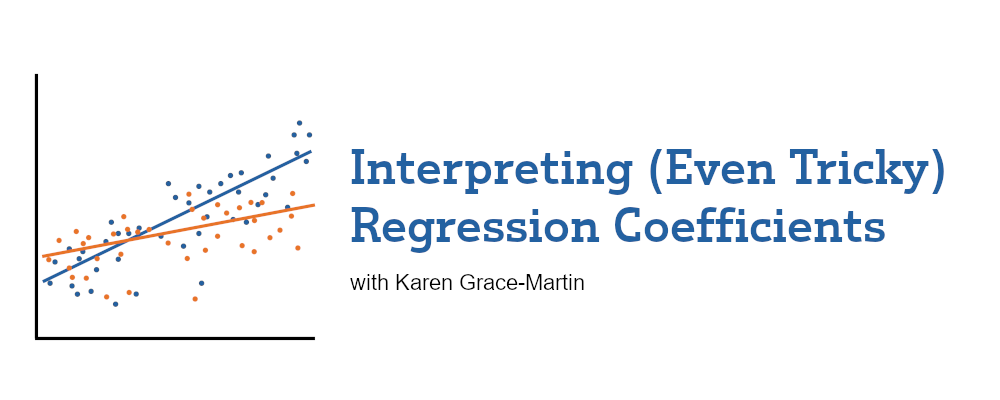
Understanding regression output got you stymied?
Frustrated with how to read the coefficients for categorical variables?
Panicked because you added a new variable or interaction, and it changed all the other results in the model?
Uneasy about understanding your regression or ANCOVA results well enough to write them up?
Most researchers can relate!
Let’s face it: The statistics classes you’ve had so far have probably focused on straightforward models with only continuous predictors.
But real research, unfortunately, isn’t usually that simple.
At some point, you’re going to need to build a more complex model, one that includes multiple types of predictors with different types of scaling to test all sorts of research questions:
- Binary and multicategory dummy variables
- Centered, rescaled, and standardized variables
- Predictors that are correlated with each other, though not quite collinear
- Variables you had to transform to meet assumptions, but now look completely meaningless
- Interactions between two continuous variables or between categorical and continuous variables
- Quadratic terms that allow you to test a curvilinear relationship with a linear model
There are ways to set up the model so the interpretation is much easier.
When you understand linear regression coefficients for all types of predictor variables, you can build more sophisticated and accurate models. AND you can easily translate your findings into meaningful results.
Bridging the gap to a deeper understanding of regression coefficients is within your reach.
Our solution: This foundational workshop that’s essential for anyone undertaking data analysis for publication or a thesis.
I’m Karen Grace-Martin, workshop instructor.
As president and founder of The Analysis Factor, I’ve been supporting researchers like you through their statistical planning, analysis, and interpretation since 1997.
By the end of this workshop, my goal is for you to understand linear regression coefficients for all types of predictor variables. You’ll know how to set up your models so that later interpretation is much easier.
And when you do go on to learn multilevel models, logistic, Poisson, or any other kind of regression, you can focus on the unique challenges of that type of modeling rather than getting stuck on the fundamentals.
 Karen Grace-Martin MA, MA
Karen Grace-Martin MA, MA
In this six-module, online workshop, we’ll cover:
- A review of regression models with continuous predictors.
- Individual lessons on how to interpret each type of tricky coefficient.
- How all terms fit together in one big model.
- How to break the model apart to understand each term.
Who Is This Workshop For?
This workshop is for you if:
- You are learning an extension of linear regression (such as multilevel, logistic regression, or proportional hazard models) and aren’t sure how to understand the results.
- You are using linear regression or analysis of covariance — but you’re far from experienced at it and want to really understand the implications.
- You are prepping to defend your regression analyses and need a rock-solid understanding of the meaning of your models.
- Your statistics training focused mostly on ANOVA, and not so much on linear regression, and you’re finding your lack of understanding of regression is limiting your ability to apply appropriate analyses to your data.
It is NOT for you if you:
- Are looking for training on steps to RUN the model. This workshop is about understanding the results. It will help you make future decisions about how to scale variables and the usefulness of terms like interactions and polynomials, but it’s really not about model building.
- Already feel comfortable interpreting interactions, know how recoding predictors affects the information the model tells you, and are a whiz at dummy coding.
- Have never run any data analysis before. If it’s been a while, no problem–you’ll love this workshop–but if you’re a beginner, you won’t.
“Before the workshop, I didn’t realize how centering predictors can help decrease correlation or how to interpret an interaction between two continuous variables. As reviewers are demanding more complete and thorough analyses, these two skills will make my research more competitive.”
— Ursula S., Research Consultant, Previous workshop participant —
How Does It Work?
This course is a 6-module online workshop.
All lessons and software demonstrations are pre-recorded. At your convenience, watch the video lessons, watch the video software demonstrations, do the exercises, and review the software syntax of your choice to implement the examples in the lessons.
Want support implementing what you’ve learned in your own research? Consider joining Statistically Speaking for full support from your team of mentors. As a Member, you will also receive a discount on this workshop.
Where Do I Access Recordings and Material?
For each of the six modules, you will have a set of training resources and material.
As a participant of the Interpreting (Even Tricky) Regression Coefficients workshop, you can access these for 12 months in our participant-only website.
 Data Sets
Data Sets
Real research data sets in Stata, SPSS, SAS, and R formats.
 Exercises + Solutions
Exercises + Solutions
Try out what you’ve learned in each module to cement the material. Never get stuck with provided syntax and interpretations.
 Software Syntax and Demo Videos
Software Syntax and Demo Videos
Step-by-step videos for Stata, SPSS, SAS, and R. Syntax files available to download so you can save and edit them for your own analysis.
 Handouts
Handouts
Session slides and supplementary material to support your learning.
 Lesson Videos
Lesson Videos
You can watch the lesson videos on your own preferred schedule.
 Suggested Resources
Suggested Resources
External videos, articles, or exercises that we recommend to support your learning.
You’ll have access to this site and all the related materials and resources for ONE FULL YEAR.
Often, our students report they understand the material at a deeper level on a second or third pass. You’ll learn more every time, so take advantage of it!
“The materials, technology, organization, and topic selection are all excellent; a model of
online instruction.”
— Previous workshop participant —
What’s Covered in the Workshop?
Module 1: Introduction and Review of Regression Models with Continuous Predictors
We specifically will cover:
- A Review of the simple linear regression model
- A Review of the multiple linear regression model with continuous predictors
- Interpreting regression coefficients when predictors are correlated
- How interpretation differs (or not) for different types of predictors: covariates, confounders, suppressors, and more
Module 2: Scaling of Dependent and Independent Variables
- Understanding unstandardized and standardized coefficients
- How and when to center predictors to improve interpretability of coefficients
- How transforming Y or X to meet assumptions affects the interpretation of coefficients
- When centering affects the meanings of other coefficients in the model
Module 3: Multiplicative Terms for Continuous Predictor Variables
- What quadratic terms tell you about the curved relationship between X and Y
- How to break apart the linear trend from the curvature to understand both coefficients
- An introduction to interactions
- Interpreting interactions between two continuous variables
- Interpreting interactions with quadratic terms–changing the curve
Module 4: Dummy Coding Binary Predictors: Main Effects and Interactions
- The basic difference between dummy and effect coding
- How to dummy code binary predictors, what the coefficients mean, and when including dummy variables changes other coefficients
- How to interpret interactions for dummy-coded predictors
- How including interactions changes coefficients of main effects (this is different from ANOVA!)
Module 5: Dummy Coding Multi-Category Predictors: Main Effects and Interactions
- How to dummy code multicategory predictors and interpret their coefficients
- How to interpret interactions for multicategory dummy predictors
- How to interpret interactions between two dummy-coded variables
Module 6: Putting It All Together
Now that you understand all the pieces, we’ll start with how to intentionally choose the scaling and coding of variables, even when it seems a choice isn’t available. Then we’ll see how all the terms fit together in one big model, and how to break the model apart to understand each term. (This is often the trickiest part.)
Pay in Full or in 3 installments of $100 (Your first installment will be billed today and your credit card will automatically be billed every 30 days for the remaining 2 payments)
“The instructor was delightfully pleasant, knowledgeable, slow paced, non-judgmental, and responsive.”
— Previous workshop participant —
Prerequisites
So what kind of background in statistics do you need?
This workshop is for researchers, not statisticians. That being said, you’ll get the most from this workshop if you have a MINIMUM of at least two statistics classes—an intro class, and a class that contains multiple regression or Analysis of Variance (ANOVA).
If you are a beginner, you may have trouble keeping up. However, if you’ve had one statistics class, but are working on regression and are confused, this workshop will be helpful.
If you have questions about whether you’re ready, just email us. We’ll give you our honest opinion. We want you to succeed!
Your Satisfaction Is Guaranteed
We want you to be satisfied. If you participate in a workshop and find you are not satisfied, we will give you a full refund. Just notify us within 30 days of purchasing the program.
FAQs
Q: I haven’t taken a statistics course in years. Will I be able to keep up?
A: As long as you have the suggested prerequisites (some knowledge of linear regression), you should be fine.
However, you WILL need to spend some time each week, both going over the material and also “getting your hands dirty” with some data. Expect to spend 4-5 hours per week reviewing the material and doing the exercises, and re-running class examples on your own.
You know how this goes: The more time you put in, the deeper your understanding.
Q: What’s your refund policy?
A: We want you to be satisfied. If you participate in a workshop and find you are not satisfied, we will give you a full refund. Just notify us within 30 days of purchasing the program.
Q: Do you offer discounts?
A: Statistically Speaking members receive a 20% off discount on all workshops. You can read about and sign up for a Statistically Speaking membership here.
Q: Things are very busy at work right now, and I’m afraid I won’t have time to keep up. How much time per week does this really take?
A: We’ve worked hard to make sure people can take a workshop in the midst of their normal work life.
Each module’s lesson contains 90 minutes to 2 hours of videos. You may also want to view our software demonstration videos. We include those for four software programs. You’ll obviously need more time if you watch more than one.
We provide exercises, answers and data sets, so you can practice what you’ve learned each lesson. These will take you a few hours per lesson, maybe up to 3 or so. The exercises aren’t required — you’re not graded. But we’ve gotten feedback that they’re very helpful, as it allows you to practice and figure out what you did and didn’t understand.
In other words, each lesson, there are approximately 2 hours of instruction and about 2-3 hours of practice time.
One reminder: You have access to the workshop website and all materials for a year. You can progress on your schedule.
Q: I’m outside the U.S. Can I still participate?
A: Yes. We have participants in our workshops from many different countries all over the world. You will want a stable internet connection.
Q: Can I pay with Paypal?
A: Yes. When you check out, you can pay directly using our system or with Paypal. However, the three-payment option is not available using PayPal.
Have additional questions? We’re here to help! Just email us at support@theanalysisfactor.com.
